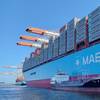Making Data a Priority is Key
During a conference in Oslo, KVH CEO Martin Kits van Heyningen urged maritime operators to utilize big data in order to remain competitive.
The future competitiveness of the maritime industry will be affected by how rapidly shipping operators take advantage of big data, according to one of the world’s leading suppliers of satellite communications to the maritime industry.
Martin Kits van Heyningen, CEO of KVH Industries, Inc., spoke at the Maritime CIO Forum at Nor-Shipping in Oslo, addressing technology issues faced by maritime leaders. “Probably the most important thing for maritime managers to do is make big data a priority,” Kits van Heyningen said. “It’s important to adopt a big data mindset, even if you don’t think of yourself as a data company. Data is becoming a resource in its own right, and offers incredible possibilities for understanding every aspect of your business better.”
During his presentation, entitled “Turning Big Data into Big Value,” Kits van Heyningen noted that the maritime industry has been slow to adopt big data even though the industry faces many challenges for which data capture and analysis can provide answers – from meeting an increasing number of maritime regulations to improving the fuel efficiency of vessels underway. “The maritime industry has spent the past 20 years trying to limit the amount of data going on and off vessels, while the rest of the world has been doing the exact opposite in adopting big data,” he said.
Computer analysis of big data goes far beyond human capacity in providing information that can make a maritime operation more efficient. For example, with real-time analysis of such data as engine monitoring, consumption rates for various fuel types, the fixed running costs of a ship, and weather data, a maritime operation can optimize a voyage for financial performance rather than just time or distance. “This is not a calculation that can be done by a human, no matter how much experience with a given route the people onboard may have,” said Mr. Kits van Heyningen. Utilizing experts for remote analysis of big data can also help with preventative maintenance to avoid costly repairs.
The business benefit of utilizing big data is widely known; a study by the Massachusetts Institute of Technology (MIT) found that data-driven firms perform 5-6 percent better each year. “There’s a growing divide between companies that use big data and those that don’t,” said Kits van Heyningen, who added that dramatic changes in the affordability of data analysis make this the right time for maritime operators to embrace big data. “You need to be creative about the questions you want big data to answer for you. It’s more important than ever to work with IT partners and satellite communications providers that can do more than just provide connectivity, but can also help you solve your real-world problems.”











